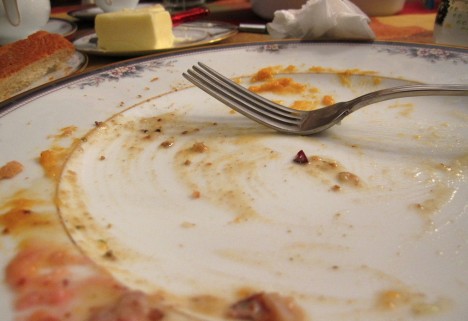The Unbearable Guilt of Not Cleaning Your Plate
(CC BY-SA 2.0) Ross Catrow/Flickr Children are starving in India. Or Poland. Or China. Or Biafra. Or Africa. You may have heard one or the other of those, depending on your age, from your mother when she urged you to clean your plate as a child. Now with the emphasis on a healthy weight, many people want to cast off that habit, but they still feel bad about “wasting food.” What to do? The Smaller Portions Solution The most important thing you can do is to put less food on your plate. You may be making enough food to feed family members who no longer live with you. Or aging and changes in activity levels may have left you in need of fewer


(CC BY-SA 2.0) Ross Catrow/Flickr
Children are starving in India. Or Poland. Or China. Or Biafra. Or Africa. You may have heard one or the other of those, depending on your age, from your mother when she urged you to clean your plate as a child. Now with the emphasis on a healthy weight, many people want to cast off that habit, but they still feel bad about “wasting food.” What to do?
The Smaller Portions Solution
The most important thing you can do is to put less food on your plate. You may be making enough food to feed family members who no longer live with you. Or aging and changes in activity levels may have left you in need of fewer calories than in the past. And yet habit and your recipes may be leading you to prepare the same amount for meals. By simply buying and preparing less you can both prevent food waste and save money.
When eating out you can order smaller portions, skip extra courses, or even order an appetizer and a salad or soup instead of a traditional main dish.
If you start with smaller portions there won’t be as much food left behind.
The Leftovers Solution
Another strategy is to develop the habit of using your extra food for future meals. Many foods can be frozen, providing an easy option for when you don’t have time or energy to cook. Bringing lunch from home using leftovers can be a key time-saving strategy, packing things up “to go” immediately as you put away food following a meal. This works if you eat lunch at home too. You also can use food you don’t eat at one meal in a different form in another meal in the next few days. For example, you can add leftover vegetables, fruit, poultry, meat and seafood to soups, casseroles, salads or sandwiches.
The Philosophical Solution
If you consider your question from another angle, eating more than what your body needs is actually wasting food because excess calories contribute to weight gain.
The good news is that you can avoid food waste working from either end – by preparing less or by using extra food for other meals – and eat food portions that support your good health.
Courtesy of the American Institute for Cancer Research

By Karen Collins, MS, RDN, CDN, FAND. Karen Collins is a nutrition writer, speaker, and consultant. She has also worked as an expert nutritional research reviewer, reading and evaluating the scientific soundness of hundreds of research studies. In recognition of her accomplishments Karen was recently named a Fellow of the Academy of Nutrition and Dietetics.
The Unbearable Guilt of Not Cleaning Your Plate is a post from:
SOURCE: – Read entire story here.







